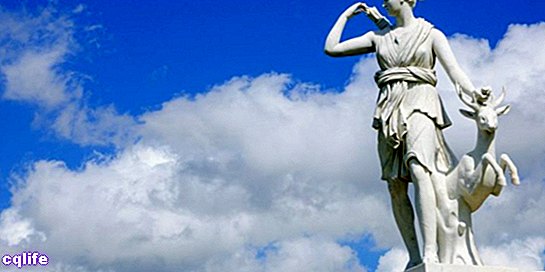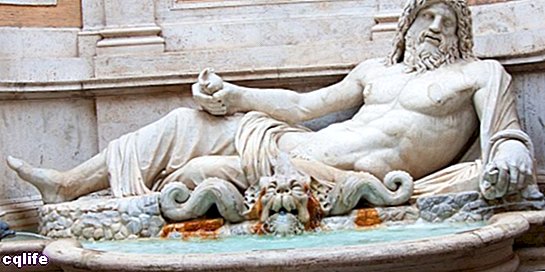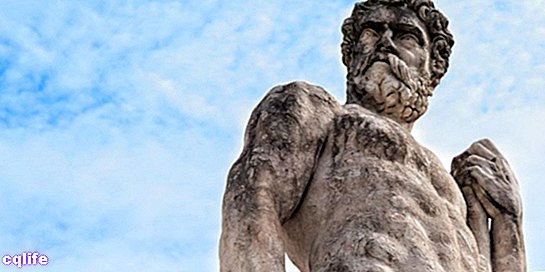We explain what is Greek mythology and the gods that make up these ancient stories. In addition, its origin and main characters.

What is Greek mythology?
When we speak of Greek mythology, we refer to the set of stories, myths Y legends belonging to Ancient Greece (c. 1200 BC-146 BC), considered as the cultural cradle of Western civilization.
It is collected in a diverse set of texts survivors to history, in which he realizes how the ancient Greeks explained the world, practiced their religion and represented their culture, as well as insculptures, illustrations, ceramics and other forms of art that respond to the same imaginary.
The stories that make up Greek mythology were initially oral in nature, since in many cases they predate the invention of writing. These stories were recited by bards or aedas, and later embodied or versioned in writing.
Some of them are also the foundation of the literature Greek, in particular the poems Homer's epics: theIliadand theOdyssey, whose events occur around the Trojan War (1250 BC according to Herodotus), or also Hesiod's poems on the genesis of the world and the Greek kingdoms: theTheogony and the Jobs and days.
Another important source of these myths is the theatrical work of the great dramatists of Ancient Greece: Sophocles, Euripides and Aeschylus. In these pieces, episodes referring to the tradition mythical and heroic, particularly in the form of tragedies: stories about the fall from grace of heroes before the gods.
Gods of Greek mythology

The ancient Greeks believed in a motley pantheon of gods, known as Olympus, since they would reside on top of a mountain with that name. After defeating their progenitors - the Titans or titanic gods - they assumed control of the world and imposed their order.
The main Olympian gods were:
- Zeus (Jupiter). King of the Olympian gods and father of many of them, he was the god of the sky and thunder, brother of Hades and Poseidon. Brother and husband of Hera, he had many human and divine lovers, giving rise to various heroic bloodlines.
- Hera (Juno). Wife of Zeus and mother goddess, of marriage and the family unit, she often took revenge for her husband's infidelities on his lovers or their offspring, for which she was antagonistic to many heroes.
- Poseidon (Neptune). God of Water and the oceans, of the earthquakes and the horses. He was represented with a trident in hand.
- Dionysus (Bacchus). God of wine, celebration and ecstasy, patron of the theater and the youngest of Olympus, born from the womb of a mortal woman.
- Apollo (Phoebus). Solar God, of the light, of knowledge and medicine, archery, music and prophecy. Son of Zeus and brother of Artemis.
- Artemis (Diana). Virgin goddess, of the hunt, the nature, delivery and all animals. Twin sister of Apollo, she was represented accompanied by a fawn.
- Hermes (Mercury). The messenger of the gods, patron of the Commerce, the rhetoric, lies and thieves, always represented with a helmet and winged boots.
- Athena (Minerva). Warrior goddess, of wisdom, craftsmanship, defense and strategy from war, often depicted with an owl. He was born from the head of Zeus, after he swallowed his mother.
- Ares (Mars). God of war, violence and bloodshed, despised by all other gods except Aphrodite, with whom he had an affair.
- Aphrodite (Venus). Goddess of carnal love, beauty and desire, born from the foam of the sea after Zeus cut off the testicles of her father Cronos and threw them into the water. Wife of Hephaestus, she was unfaithful to him with many, including Ares.
- Hephaestus (Vulcan). God of the forge, master blacksmith and craftsman, of fire and metal, son of Hera (with or without Zeus), fallen from Mount Olympus at birth, resulting in a limp.
- Demeter (Ceres). Goddess of fertility, the climatic seasons, of the farming and nature.
- Hades (Pluto). God of the realm of the dead, the underworld. Also from mining and land riches, he is often not included among the Olympians because he resides in his separate kingdom.
Origin of Greek mythology
There are various theories about the origin of Greek mythology. Some establish that the narrated events come from real events that were narrated in a way that was increasingly linked to the divine, or that they were simply interpretations of the original sacred religious myths, or even that they are nothing more than complicated allegories of a much more cult simple.
However, it is known for sure that the ancient Greeks were inspired by the imaginary of other neighboring civilizations of the Asia Minor and the Middle East, or from civilizations prior to the Hellenic, such as the Mycenaean, the Cretian, the Minoan, etc.
Greek mythology characters

Apart from the gods, some of the most famous characters in Greek mythology are:
- Heracles or Hercules. Son of Zeus out of wedlock, he was a demigod hated by Hera, who pushed him to fulfill 12 jobs. He was the greatest of the Greek heroes.
- Helena of Troy. The trigger for the bloody Trojan War, when she fled the palace of her husband Menelaus with the young Trojan Paris.
- Achilles. Demigod son of Zeus and a nymph, he was invulnerable except for his heels. He perished in the Trojan War.
- Persephone Daughter of Demeter, she was kidnapped by Hades to be his wife, and with him came to an arrangement: six months in the underworld and six months on earth, thus giving rise to the seasons.
- Oedipus. King of Thebes after mistakenly murdering his own father and marrying his mother, with whom he had offspring. Upon learning of his crimes, he gouges out his eyes and exiles himself.
